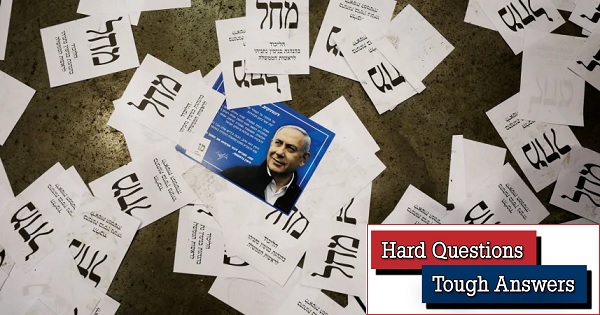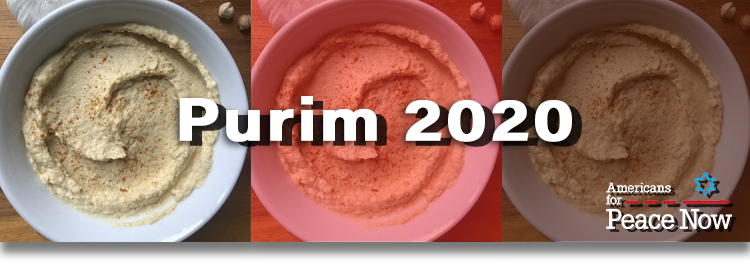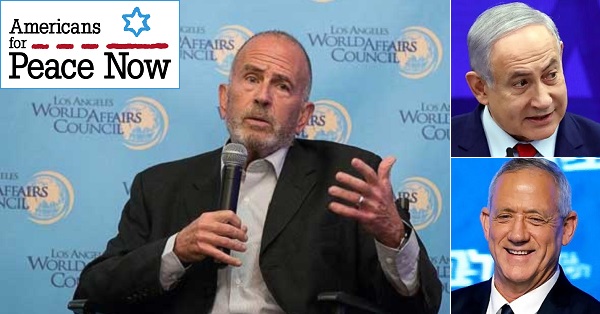

Yossi Alpher is an independent security analyst. He is the former director of the Jaffee Center for Strategic
Studies at Tel Aviv University, a former senior official with the Mossad, and a former IDF intelligence officer.
Views and positions expressed here are those of the writer, and do not necessarily represent APN's views and policy
positions.
Knesset election results as of early afternoon Israel time, with 90 percent of votes counted:
Likud: 36 Blue-White: 32 Joint Arab List: 15 Shas: 10 Torah Judaism: 7 Labor-Gesher-Meretz: 7 Yisrael Beitenu: 7
Yamina: 6
Blocs: right-religious 59, center-left 54 (Yisrael-Beitenu 7)
There were 6.3 million eligible voters and over 10,000 polling stations, including 16 mobile stations for about
4,000 quarantined corona voters.
The above count does not include some 265,000 votes of soldiers, diplomats abroad, the Corona virus quarantined,
and prison population, all of whose ballots take longer to document and count (it is not even clear who will dare
physically count the Corona voters’ paper ballots). This is the equivalent of seven or eight mandates. The bulk of
these, the soldiers’ votes, generally have the effect of removing a mandate from one or more religious parties and
adding a mandate to one or more of the secular parties.
Note: the movement of one or two mandates could prove decisive in ultimate efforts to form or block a
coalition--a possibility that is of necessity ignored in the following analysis.
Q. You are writing this Q & A about the elections against a deadline,
yet without final results. Given this constraint and based on the results at hand, what significant conclusions can
you offer about the next government?
A. First and foremost, for the third time in less than a year, there is no obvious
“next government”. There is no obvious coalition of at least 61. On the face of it, this is another hung
election.
Yet, second, Netanyahu’s Likud is once again the largest party, leading Blue-White by four mandates, and the
right-religious bloc is again the largest, by a four-mandate margin. This is Netanyahu post-indictment, with his
trial commencing in two weeks! In this election he demonstrated that despite the corruption charges and with the
help of endless ugly maneuvers, dirty tricks and uninhibited mudslinging, he can maintain the loyalty of nearly
half the electorate to his party and its allies.
In the eyes of the other half, Netanyahu demonstrated that for too many Israelis the rules of law and decency are
not important, and that the primacy of sovereign national values (“mamlachtiut”) introduced by David Ben Gurion is
no longer respected.
Third, “nearly half” is an important stipulation. Netanyahu is still two mandates shy of the 61 mandate Knesset
majority he needs to form a government and, through legislation, try to shield himself from prosecution and
conviction.
Fourth, Blue-White’s decline to second-largest party reflects a failure to counter Netanyahu’s blunt tactics and
boundless conspiratorial energies. Netanyahu blitzed voters with endless clips and robot-calls promising victory if
only his supporters will get out the vote. He concocted endless preposterous lies and allegations about Gantz, from
fear of attacking Iran to an affair with a minor. It was enough that even a little of the mud stuck.
Gantz’s response was a far more civilized campaign aimed at stopping Netanyahu, but little more. If the outcome is
a fourth round, Blue-White leader Benny Gantz may step aside. He has emerged as too mild-mannered and upstanding
for the Israeli electorate with its consistent drift to the ultra-nationalist right. His rhetorical skills,
compared to Netanyahu’s, leave something to be desired. The Blue-White party may now be in danger of disintegrating
into the three smaller lists that formed it.
If Bibi is the clear winner of this round--though still short of a government--Gantz is the clear loser. Indeed,
all three of Blue-White’s ex-IDF chief of staff leaders, all raised on “mamlachtiut”, proved no match for
Netanyahu’s consistent sleaze tactics.
To save Blue-White, the best bet to replace Gantz at the party’s helm is Gaby Ashkenazi, another former IDF chief
of staff who in three straight elections has displayed more charisma that Gantz. It was Ashkenazi who, scarcely a
year ago, brought together Gantz’s and Moshe Yaalon’s nascent parties with Yair Lapid’s Yesh Atid to form
Blue-White. And as a Mizrachi or Sephardic Jew of mixed Syrian-Bulgarian heritage he might be better suited to draw
votes from Netanyahu’s Likud and even from Shas, which performed surprisingly well this time around.
Fifth, the United Arab List with 15 mandates, up from 13, is growing from election to election by recruiting more
and more Arab votes. It is declaring that, politically, Israel’s Arab sector can no longer be ignored. The United
List’s achievement this time around is truly dramatic, possibly overshadowing Netanyahu’s.
Sixth, if anyone needed proof that the parties of old that used to run things in Israel have become totally
defunct, this election delivered it. Labor, together with Meretz and Gesher, is down to 7 mandates. Yamina, which
embodies the remains of the National Religious Party, the “Mafdal”, is down to 6 mandates. Labor along with what is
today Meretz and the NRP used to run the country. How the mighty have fallen!
Q. Assuming no significant change in this outcome in the next day or two,
what can we expect? What are your scenarios?
A. Here they are, in no particular order (order seems impossible in the current
chaos):
A fourth round next October or November cannot be excluded. Still, a rising wave of disgust among the public and
the politicians, supported by President Rivlin, could motivate one or more parties or politicians to cross over the
political divide, if only to form a “temporary” coalition with the goal of legislating our way out of this
mess.
Here the prime candidate is Avigdor Liberman and his “right-secular” Yisrael Beitenu. Throughout these three
consecutive elections, Liberman has placed himself beyond the two blocs, thereby helping prolong Israel’s political
stagnation. He has promised voters “no fourth round”. Will he now opt to rejoin Netanyahu in a right-religious
coalition? Alternatively, will he overcome his visceral opposition to the ever-growing Joint Arab List and agree to
join Blue-White and Labor-Gesher-Meretz in a centrist minority coalition that is supported externally by all or
part of the Arab members of Knesset?
Could Rivlin refuse to empower the winner, Netanyahu, to form a coalition, citing the fact that Netanyahu is under
indictment on multiple counts of fraud and breach of trust? Such a courageous move could give the final word to the
High Court of Justice, to which Netanyahu would appeal.
Could another right-wing party like Yamina bolt and join with Blue-White?
Could Blue-White be persuaded by Netanyahu and perhaps by Rivlin to join with Likud in a centrist coalition that
features rotation of the premiership and some provision regarding Netanyahu’s pending trial? This option was
rejected last time around by Blue-White. Among other objections, Blue-White consistently cited Netanyahu’s lack of
credibility when he agrees to rotation.
Conceivably, too, Netanyahu could persuade two or three members of Knesset from the center-left to bolt their
parties and, in return for ample political rewards like ministries, join or rejoin the Likud to give the
right-religious bloc a 61 MK majority. Netanyahu and his closest allies have been hinting at this possibility for
days, ever since pre-election polls showed the Likud pulling ahead of Blue-White in the vote count. Candidates with
known right-wing inclinations include Orly Levi-Abakasis of Gesher, the ultra-Orthodox Omer Yankelevitch of
Blue-White, and former Likudniks Zvi Hauser and Yoaz Hendel of Blue-White.
Speaking of coopting, Netanyahu has in the past not shied away from doing deals with Arab parties. Could he try to
offer all or part of the Joint Arab List inducements to support, even passively, a Likud-led government?
Anything is possible.
Q. At the level of values and issues, can you point to Netanyahu’s
advantage and Gantz’s disadvantage as demonstrated in these elections?
A. This is not an easy task. Netanyahu convinced his electorate that the corruption
accusations against him are trivial at best and that he can manage a government while dealing with them or,
alternatively, legislating them away. He will prioritize some sort of rule of the masses, or just obscure and
confusing reasoning, over the rule of law. Here, for example, is prominent Netanyahu supporter Yifat Erlich’s
astounding logic, in Yedioth Aharonot on March 1: “Precisely because PM Benjamin Netanyahu can no longer be
pressured and no one can threaten him with indictment because he already has three of them, he can restore the
state of Israel to democratic normalcy.”
Netanyahu also clearly benefited from Trump’s ‘deal of the century’, which ostensibly demonstrated to Israelis that
they can annex West Bank lands with the blessings of the world’s superpower, thereby dovetailing with Netanyahu’s
election promises.
Here, by the way, Gantz stumbled. He knew a large majority of Israeli Jews were enthusiastic about Trump and his
policies. A dove at heart, Gantz tried to persuade voters that he, like Netanyahu, would annex territories, but
only “after consultation with the international community”. Too many potential Gantz supporters got the message:
when the smoke clears, he won’t really annex because the international community and the Arab world have made it
clear that they vigorously oppose annexation.
By the same token, Netanyahu repeatedly hammered away with the argument that without the Joint Arab List, Gantz
would have no coalition and that the Arab MKs are a traitorous fifth column. Gantz denied unconvincingly that he
would need the support of Arab MKs. Yet he could never point to alternative support from, say, another
right-religious list besides Liberman’s. All those right-religious lists constantly pledged allegiance to
Netanyahu’s “bloc”. Anti-Arab voters did the math.
Q. Let’s assume the atmosphere will continue to be one of uncertainty, due
either to months of problematic coalition talks or a fourth round or one followed by the other. What harsh
realities does the country face?
A. Besides the obvious cumulative and demoralizing dangers to the rule of law and to a
healthy civil society? Beyond them, Israel faces a series of unresolved strategic issues that will seemingly remain
unresolvable.
Take Iran’s threat from the north and its mismanaged nuclear threat for starters. The Palestinian issue--both the
Trump plan and the Hamas/Gaza challenge—is once again gaining urgency and centrality. The economy has been
functioning for a year without an approved budget, and virtually all national institutions are suffering as a
consequence, beginning with the near-total absence of Knesset legislation and supervision. And last but by far not
least, more than ten years of Netanyahu’s policies have brought about the growing alienation of the American Jewish
mainstream, Israel’s key strategic ally.
Don’t be surprised if, one of these failed elections, something very central to Israel’s overall well-being
“gives”.
For previous editions of Hard Questions, Tough Answers, go to the Index Page.




 Trump is the king of
mendacity, the master of duplicity, the maestro of deceit. Trump’s world is
a tapestry of lies masquerading as truth, falsehoods masquerading as facts,
conspiracy theories dressed as realities, conflict-escalation posing as
conflict-resolution, endless occupation spun as liberation, and national
subjugation masked as sovereignty and statehood.
Trump is the king of
mendacity, the master of duplicity, the maestro of deceit. Trump’s world is
a tapestry of lies masquerading as truth, falsehoods masquerading as facts,
conspiracy theories dressed as realities, conflict-escalation posing as
conflict-resolution, endless occupation spun as liberation, and national
subjugation masked as sovereignty and statehood.
 Trump and his aides need
neither
Trump and his aides need
neither
 P.S. Receive Peace
Now's unique deck of playing cards,
P.S. Receive Peace
Now's unique deck of playing cards,

 A conversation with Yadin Kaufmann, an Israeli technology
investor, social entrepreneur and writer. A veteran venture capitalist, Kaufmann works to stimulate a
Palestinian high-tech industry.
A conversation with Yadin Kaufmann, an Israeli technology
investor, social entrepreneur and writer. A veteran venture capitalist, Kaufmann works to stimulate a
Palestinian high-tech industry.





 Listen to the recording of the Tuesday, March 3rd briefing call
with
Listen to the recording of the Tuesday, March 3rd briefing call
with